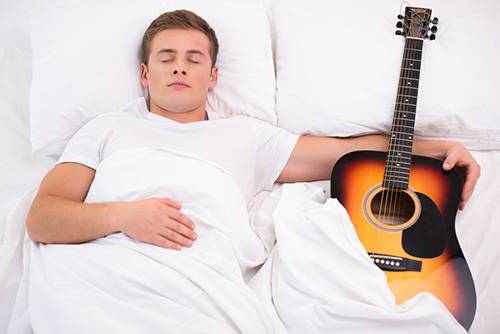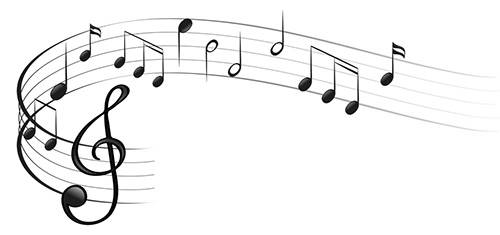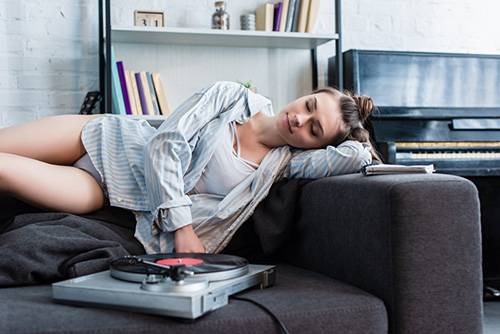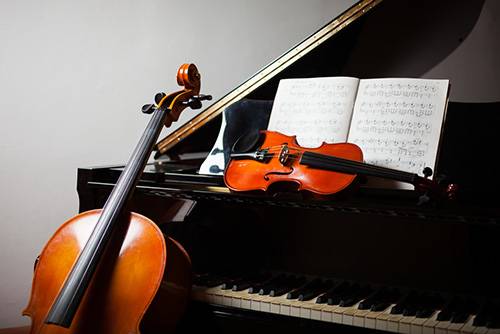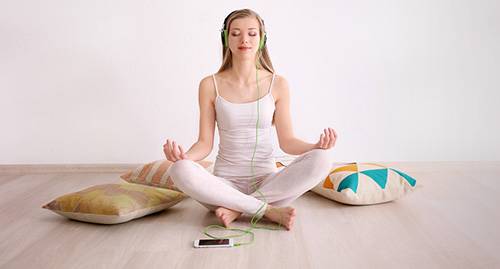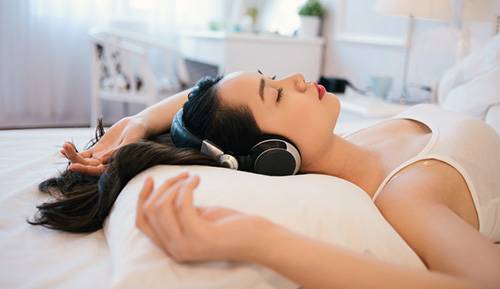
Music & Sleep
When our ear picks up certain musical frequencies, it translates them into electrical signals in the brain. The brain will then interpret these sounds, leading to a series of physical effects happening inside the body. The result of these effects is what usually put us to sleep or, at least, reduce some of the problems that get in the way of us falling asleep.
A series of studies points out the fact that music helps improve the quality of sleep because it regulates certain hormones within the body. One of these hormones is cortisol or, as we like to call it, the stress hormone. High levels of cortisol cause us to be more alert, thus reducing the quality of sleep. When you listen to music, cortisol levels tend to decrease, which then causes us to feel more relaxed and puts us in a better mood for sleeping.
Another effect that music has on our hormones is to trigger the release of dopamine. Dopamine is a hormone that’s usually released when we engage in pleasurable activities, such as eating or exercising. A higher level of dopamine can lead us to feel less pain and increase our feeling of well-being, thus preparing us for a deeper and relaxing sleep.
Music can also help soothe our autonomic nervous system, which is responsible for all the conscious and unconscious processes (which includes everything from our heartbeats to our digestive system). What music can do is to calm parts of this system, slowing down breath, reducing blood pressure, and lowering the heart rate: all of them being conditions that calm our bodies down and prepare them for sleep.
Music is also known for its ability to help with anxious thoughts that usually surface when going to bed. It encourages the mind to relax and chases away troubling thoughts that could prevent one from falling asleep.
Lastly, we can’t neglect the fact that sometimes our sleep is disrupted by all kinds of sounds heard in our sleeping environment, including street noise that comes from cars, barking dogs, and other similar sounds. People that live next to high-traffic roads or airports are even more likely to have poor sleeping schedules, as these loud noises make it harder for them to fall asleep or tend to wake them up in the middle of the night. In the long run, this could have a bad impact on their health, leading to problems somewhere along the lines of cardiovascular diseases.
What’s the Most Relaxing Sleep Music?
Needless to say, not all types of music can put us in a relaxing mood, but why exactly does that happen? Researchers have looked into different kinds of music genres and studies the effects they have on the human body and mind. However, studies have failed to reveal what is the perfect music to fall asleep to.
One of the reasons why these studies were somewhat inconclusive and not able to determine a very best music genre to fall asleep to is because different kinds of people have different music preferences, and researchers have used self-curated playlist without necessarily taking into account what each subject prefers in terms of music.
What we do know is that the tempo of the music you listen to before falling asleep plays a major role in determining whether said music is efficient in helping you sleep or not. Tempo is a term used to describe the speed of the music being played, and it’s generally measured in BPM (short for “beats per minute”). Normal resting heart usually beats at speeds that vary from 60 to 100 beats per minute, so the music used in studies was around 60 to 80 BPM. So, the end goal here is to choose music that goes in sync with how a normal resting heart is supposed to beat, so that the heart will eventually mimic the tempo of the music.
Plenty of online music services have decided to create playlists with music that matches these requirements especially for people that don’t want to make their own relaxing playlists. In fact, the very same music services have created playlists that are suitable for all kinds of activities, including working or exercising. Generally speaking, the ones that are focused on inducing a state of sleep are usually those that contain calming music genres, such as classical music.
What Are the Most Popular Sleep Music Genres?
If you want to create your own sleeping playlist but aren’t sure where to start, let’s take a look at some of the most popular genres that have had success in helping other people sleep:
— Classical music
This is probably the music genre that’s most associated with a state of tranquility but not every classical song has what it takes to put people to sleep. The tempo of certain tunes can be quite alert, giving you energy rather than putting you to sleep. Generally speaking, piano symphonies are considered to be amongst the best for falling asleep.
— Contemporary classical
Another great musical suggestion for falling asleep is contemporary classical music, as this genre doesn’t have a lot of ups and down, and doesn’t really cause any excitement when listening to it. The emotional responses that people get when they listen to contemporary classical music aren’t that significant, so it might just be the best choice for those of you looking to fall asleep faster.
— Chill-out music
There are plenty of genres that fall under the chill-out music umbrella, ranging from pop to blues. The main reason why this music genre typically gets the job done is because it causes your mind to avoid overthinking by setting up a specific ambient mood. You know chill-out music works if it causes you to stare at the ceiling and make you feel like you’re slowly drifting away.
— Meditation music
This particular genre is created primarily to get your mind into a state of relaxation. Nature sounds might also be used in the tunes of meditation music, as they are both soothing and relaxing.
Tips for Finding Music That Relaxes You
Sometimes, it’s also a matter of experimenting until you find the right songs that you could fall asleep to. Since music can play an important role in one’s sleep hygiene, here are a few tips that might help you put music to good use:
● Don’t listen to songs that trigger bad memories or cause you to have strong emotional reactions. It is perfectly normal for the human mind to associate certain songs with emotional events from the past, but these should be avoided prior to sleeping time. Instead, choose songs that are neutral.
● When you’re experimenting to find out which music helps you relax the most and can actually put you to sleep, choose songs with different kinds of tempos until you find the BPM range that’s most suitable for you. Some people feel more relaxed when they listen to slow music, but others tend to have more positive thoughts and attitudes when they listen to upbeat music. What works for another person doesn’t necessarily have to work for you too.
● Don’t expect to instantly fall asleep from the first night you’ve tried integrating relaxing music as part of your sleep hygiene. Routine is very important and being consistent about it going to render proper long-term results. Also, keep in mind that relaxing music is just a tiny part of a healthy sleep routine, so you might have to improve other aspects and pre-sleep habits before you can achieve a consistent night-time routine that helps you fall asleep faster and puts you to sleep until the break of dawn.
● Understand that there is no music in the world that could help you fall asleep in seconds. It helps you relax, that’s true, but if you fall asleep quickly, it’s probably because you’re exhausted and not because of the music per se. Music helps set the mood, but it can’t do wonders all on its own.
Conclusion
It’s really important for you to keep in mind that, while music can help you sleep better and fall asleep faster, it is just one piece of a larger puzzle. Sleep hygiene is about more than just listening to the right tunes at the right time. It’s also about avoiding heavy meals before bed, making sure that all electronics are turned off before sleeping, avoiding the use of electronics at least one hour before going to bed, avoiding any bright lights from entering the bedroom, making sure there’s fresh air in the room and having the right room temperature, and many others.
